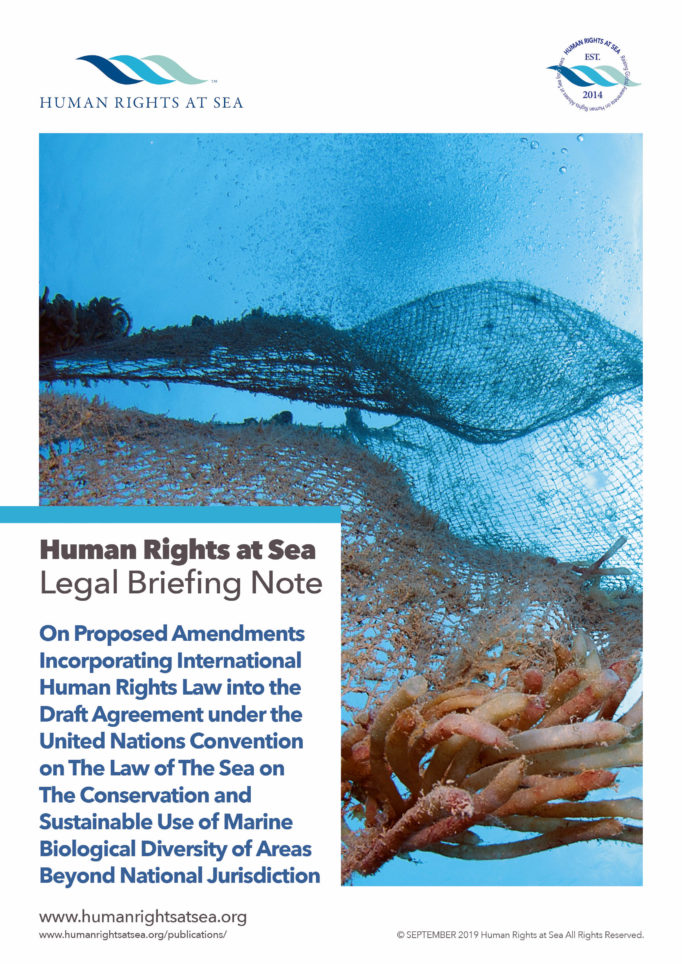London, UK. Human Rights at Sea published a short independent legal briefing note on proposed amendments to the draft agreement under the United Nations Convention on the Law of the Sea on the conservation and sustainable use of marine biological diversity of areas beyond national jurisdiction to include International Human Rights Law.
These amendments note an absence of human rights references reflecting protection of any degree for human intervention at sea needed to support, uphold and enforce such a new treaty.

While human rights are not the focus of the draft agreement, the charity believes the agreement should explicitly refer to the applicability of international human rights standards in its implementation. There is an increasing recognition on the international front that environmental issues and human rights are inextricably linked, and this is the case as much at sea as it is on land.
The 30-August-2019 report from the third session (16-30 August 2019) in New York of the Intergovernmental Conference on the proposed international legally binding instrument, which is stated as coming into effect in 2020, headlined that delegates stressed the treaty needed to be robust and practical in application.
Drafts have dominantly focused on the conservation and marine bio-diversity aspects of the proposed treaty leaving a gap for the protections of the people who will be required to ensure the treaty’s success at sea.
Human rights apply at sea as they do on land, but there still remains a gap in the legislative framework concerning the laws of the sea, which does not explicitly refer to international human rights law. Human Rights at Sea, as an independent civil society NGO, has initiated proposed minor amendments which if implemented could make a significant difference to the international reinforcement of human rights at sea. Further, it has linked the amendments to the developing Geneva Declaration on Human Rights at Sea, the aim of which is to raise global awareness of the abuse of human rights at sea and to mobilize a concerted international effort to put an end to it.
Proposed Amendments:
ADDITIONAL CLAUSE IN THE PREAMBLE:
“Recognizing the need to promote and encourage the respect for human rights and fundamental freedoms for all without distinction as to race, sex, language, or religion in achieving international cooperation to solve international problems,” (Based on UN Charter); or
“Recognizing that the human rights and freedoms set out in the Universal Declaration on Human Rights apply on sea as they do on land.”
ARTICLE 4: Relationship between this Agreement and the Convention and other [existing] relevant legal instruments and frameworks and relevant global, regional and sectoral bodies….
3. This Agreement shall be interpreted and applied in a manner that [respects the competences of and] does not undermine [existing] relevant legal instruments and frameworks [including international human rights laws] and relevant global, regional and sectoral bodies, and that promotes coherence and coordination with those instruments, supportive of and do not run counter to the objectives of the Convention and this agreement [or the purposes contained in the UN Charter]; or
[5. The provisions of this Agreement shall be interpreted and applied in a manner that respects the rights and freedoms set out in the Universal Declaration on Human Rights and other relevant international human rights laws.]
Human Rights at Sea Founder, David Hammond, commented: “This is probably the best and only opportunity in recent time to update the international Law of the Sea regime to become wider in effect, not just for the safeguarding of marine bio-diversity and conservation essential for the sustainability of our oceans for future generations, but for all persons living, working, transiting, or engaged in any other type of activity at sea in territorial and international waters around the globe.”
Human Rights at Sea will be passing its recommendations to the UN and State government departments.
